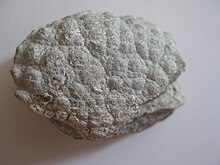HD 83944
HD 83944| 관측 데이터 Epoch J2000.0 이쿼녹스 J2000.0 | |
|---|---|
| 별자리 | 카리나 |
| 우측 상승 | 09h 39m 20.99948s[1] |
| 탈위임 | −61° 19′ 41.0167″[1] |
| 겉보기 크기 (V) | 4.51[2] |
| 특성. | |
| 진화 단계 | 주계열[3] |
| 스펙트럼형 | B9IV/V[4] |
| B-V색지수 | −0.070±0.340[2] |
| 변수형 | 의심스러운[5] |
| 아스트로메트리 | |
| 방사 속도 (Rv) | 20.0±4.2km[2]/s |
| 고유 운동 (μ) | RA: −34.09[1]mas/yr Dec.: +18.55[1]mas/yr |
| 시차 (π) | 14.45 ± 0.15[1] 마스 |
| 거리 | 226 ± 2 리 (69.2 ± 0.7 pc) |
| 절대치수 (MV) | 0.31[2] |
| 세부 사항 | |
| 미사 | 2.88±0.03[3] M☉ |
| 루미도 | 95.71[2] L☉ |
| 표면 중력 (log g) | 4.33±0.14[6] cgs |
| 온도 | 11,561±393[6] K |
| 회전 속도 (v sin i) | 36km[3] 또는[6] 51km/s |
| 나이 | 99Myr[6] |
| 기타 지정 | |
| 데이터베이스 참조 | |
| 심바드 | 자료 |
HD 83944는 카리나 별자리에 있는 항성계통이다.여기에는 바이엘 명칭 m Carinae가 있으며, HD 83944는 Henry Draper 카탈로그의 식별자다.진폭이 0.5인 4.51[2] 전후로 변동하는 명백한 시각적 크기를 가진 의심 변수다.[8]이 시스템은 시차를 기준으로 태양으로부터 약 226광년 거리에 위치하며, 절대 크기는 0.31이다.[2]공동 움직이는 스타들의 카리나 협회의 회원이다.[9]
이전에는 단일 별이라고 믿었지만,[10] Chini 외 연구진(2012)은 이것이 이중 선 분광 이항이라는 것을 발견했다.[11]B9의 별분류항성모델은 항성이 여전히 주계열성이라는 것을 나타내지만 IV/V는 준거성 단계로 진입하는 항성과 일치한다.[4][3]
참조
- ^ a b c d e van Leeuwen, F. (2007), "Validation of the new Hipparcos reduction", Astronomy and Astrophysics, 474 (2): 653–664, arXiv:0708.1752, Bibcode:2007A&A...474..653V, doi:10.1051/0004-6361:20078357.
- ^ a b c d e f g Anderson, E.; Francis, Ch. (2012), "XHIP: An extended hipparcos compilation", Astronomy Letters, 38 (5): 331, arXiv:1108.4971, Bibcode:2012AstL...38..331A, doi:10.1134/S1063773712050015, S2CID 119257644.
- ^ a b c d Zorec, J.; Royer, F. (January 2012), "Rotational velocities of A-type stars. IV. Evolution of rotational velocities", Astronomy & Astrophysics, 537: A120, arXiv:1201.2052, Bibcode:2012A&A...537A.120Z, doi:10.1051/0004-6361/201117691, S2CID 55586789.
- ^ a b Houk, Nancy; Cowley, A. P. (1979), Michigan catalogue of two-dimensional spectral types for the HD stars, vol. 1, Ann Arbor, Michigan: Dept. of Astronomy, University of Michigan, Bibcode:1978mcts.book.....H.
- ^ Samus, N. N.; Durlevich, O. V.; et al. (2009), "VizieR Online Data Catalog: General Catalogue of Variable Stars (Samus+ 2007-2013)", VizieR On-line Data Catalog: B/GCVS. Originally Published in: 2009yCat....102025S, 1: B/gcvs, Bibcode:2009yCat....102025S.
- ^ a b c d David, Trevor J.; Hillenbrand, Lynne A. (2015), "The Ages of Early-Type Stars: Strömgren Photometric Methods Calibrated, Validated, Tested, and Applied to Hosts and Prospective Hosts of Directly Imaged Exoplanets", The Astrophysical Journal, 804 (2): 146, arXiv:1501.03154, Bibcode:2015ApJ...804..146D, doi:10.1088/0004-637X/804/2/146, S2CID 33401607.
- ^ "HD 83944". SIMBAD. Centre de données astronomiques de Strasbourg. Retrieved 2020-01-26.
- ^ Samus, N. N.; et al. (2017), "General Catalogue of Variable Stars", Astronomy Reports, 5.1, 61 (1): 80–88, Bibcode:2017ARep...61...80S, doi:10.1134/S1063772917010085, S2CID 125853869.
- ^ Gagné, Jonathan; Faherty, Jacqueline K. (August 2018), "BANYAN. XIII. A First Look at Nearby Young Associations with Gaia Data Release 2", The Astrophysical Journal, 862 (2): 12, arXiv:1805.11715, Bibcode:2018ApJ...862..138G, doi:10.3847/1538-4357/aaca2e, S2CID 119196799, 138.
- ^ Eggleton, P. P.; Tokovinin, A. A. (September 2008), "A catalogue of multiplicity among bright stellar systems", Monthly Notices of the Royal Astronomical Society, 389 (2): 869–879, arXiv:0806.2878, Bibcode:2008MNRAS.389..869E, doi:10.1111/j.1365-2966.2008.13596.x, S2CID 14878976.
- ^ Chini, R.; et al. (2012), "A spectroscopic survey on the multiplicity of high-mass stars", Monthly Notices of the Royal Astronomical Society, 424 (3): 1925, arXiv:1205.5238, Bibcode:2012MNRAS.424.1925C, doi:10.1111/j.1365-2966.2012.21317.x, S2CID 119120749.


